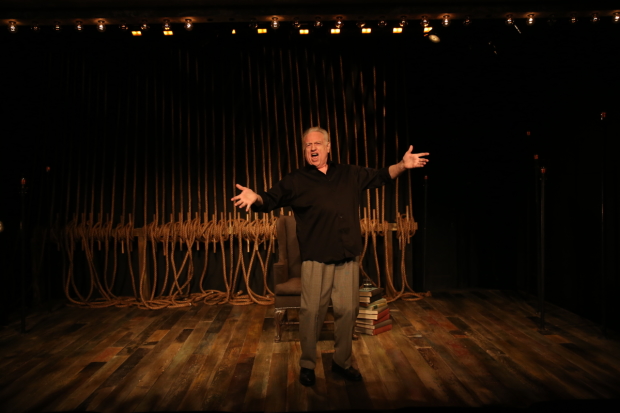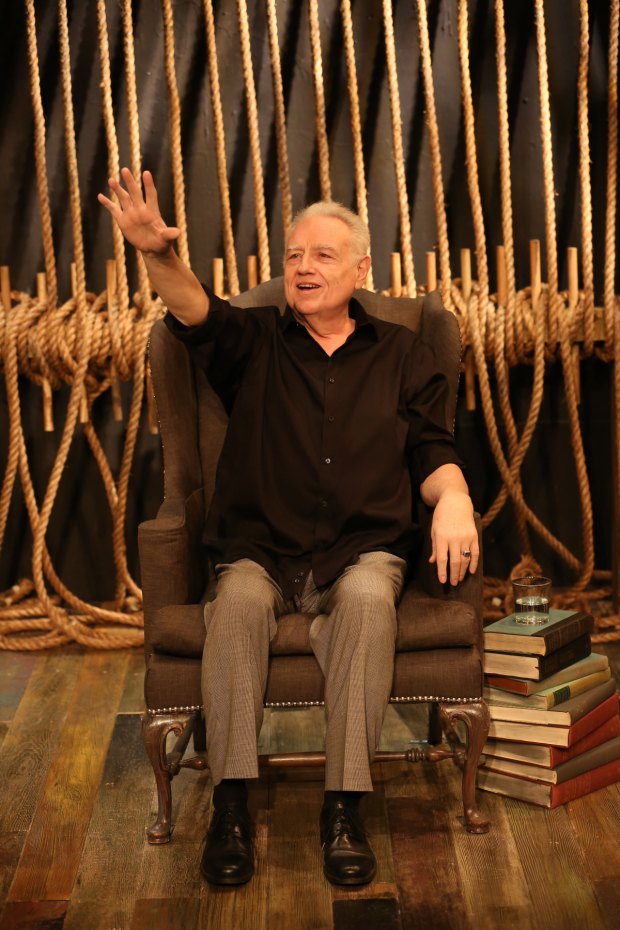Interview: Ed Dixon Remembers Georgie — a Rose by Any Other Name
Dixon’s solo show about George Rose is streaming now via TheaterMania.

(© Carol Rosegg)
"One should not have to share the stage with animals, children, or George Rose," said Richard Burton.
Katharine Hepburn seconded the motion: "In Coco, they come because of me. They stay because of George."
A third county is heard from, streaming on TheaterMania through July 18. Written by and starring Ed Dixon, and directed by Eric Schaeffer, the award-winning Georgie: My Adventures With George Rose is an intimate, affectionate, funny portrait of the late actor — with tragic underpinnings.
Rose won (or stole) two Tony Awards as Best Leading Actor in a Musical. His second makes some sense; he was all over that stage in The Mystery of Edwin Drood. His first is harder to justify. He was Alfred P. Doolittle, plainly and historically a supporting role in My Fair Lady, and he was in conspicuous competition with Henry Higgins (Ian Richardson). As Featured Actor, he has contended for Coco, My Fat Friend, and The Pirates of Penzance.
"It's because of Maury Yeston that I met George," Dixon said. "Maury asked me to do song he wrote from his musical Casanova at the BMI Musical Theater Workshop, and it really landed. Afterward, Lehman Engel came up to me, and we started talking. He said he had a production of The Student Prince going out a week later, and he hired somebody who couldn't sing the role of Detlef. Could I leave town in a week? I said, 'Absolutely.' I went out on this national tour of The Student Prince, and George played Lutz. When I told people I was going on this tour, they said, 'Oh, my God! You'll be working with George!' I said, 'Who's George Rose?'"
"His talent was intoxicating," Dixon continued. "I was in my early 20s, and I would stand in the wings every day and watch him. Later, I would talk with him in his dressing room, and he would tell me stories about Olivier and Gielgud and Richardson and Edith Evans. If he started telling a Noël Coward story, he would turn into Noël Coward. That was very normal for him. He was such an entertainer. He was more skillful at working an audience than anyone I'd ever seen — or have ever seen since. He had this capacity to break through the fourth wall and figure out the audience and deliver it in just the way for that particular audience. That's why I was standing in the wings, watching him. You never knew what he was going to do or say. He actually had it in his contract he could say anything he wanted in the show, which is unbelievable. His talent was so mercurial."
When the tour ended, Dixon figured that was that and he would never see Rose again. As it ironically turned out, they were neighbors in Greenwich Village. "I ran into him in the front of the Elephant and Castle Restaurant walking his dogs, and he invited me up for tea. He went off to the kitchen to put the kettle on, and the next thing I knew a mountain lion was nuzzling against my knee. Really! George thought it was hilarious. He loved to spring that on people. He did it often."
In addition to a lion and assorted cats and dogs, Rose lived with a 60-pound lynx, a South African wildcat, and a caracal, all of whom accompanied him on tours in a Winnebago. The man who lived dangerously onstage being "in the moment," lived dangerous offstage, too. It was his undoing.
When not center stage singing, Dixon vocal-coached, and Rose was given his name as the best person to see to do something with his voice. "He wanted to retool it for Dance a Little Closer. Suddenly, a guy I admired so much was coming to my house to study voice with me. We became close friends and saw lots of theater together. Then, he invited me down to the Dominican Republic. It was like being asked to Jamaica by Noël Coward. Of course, that's not how it went."
It went south in a sad, unexpected way. When Rose picked him up at the airport in his red Suzuki, in the backseat was one of the people who would soon be convicted of torturing and killing him.
Dixon exited that scene pronto and fled to the other side of the island. "I'd just flown down, and I wasn't about to turn around and fly back home. George tracked me down in Santa Domingo to have lunch with me — because, I guess, he wanted to see if I was OK. I said, 'This is not safe. This is not cool.' And he was, like, 'Oh, no, dear boy. It's perfectly natural. It's part of the culture.'"
Their last exchange was a telephone call. Rose wanted to know if Dixon could accompany him to a New York opening of What the Butler Saw, which Rose did in London. Dixon couldn't. Shortly afterward, news broke that Rose was found dead in a crashed Suzuki. Murder was soon proved.
"People have asked me why I wrote about it so long after the event," Dixon said. "Well, I wasn't able to write about it until I finally did." He finally got his head around it when he wrote his memoir, Secrets of a Life on Stage … and Off, and included a chapter on Rose. "It took me 30 years to realize you can admire someone greatly and they can do something you can't accept. That doesn't erase the rest of it. It took a lot of digesting to come to that position."
Buy tickets for Georgie: My Adventures With George Rose here.

(© Carol Rosegg)








